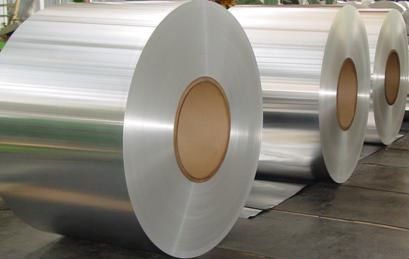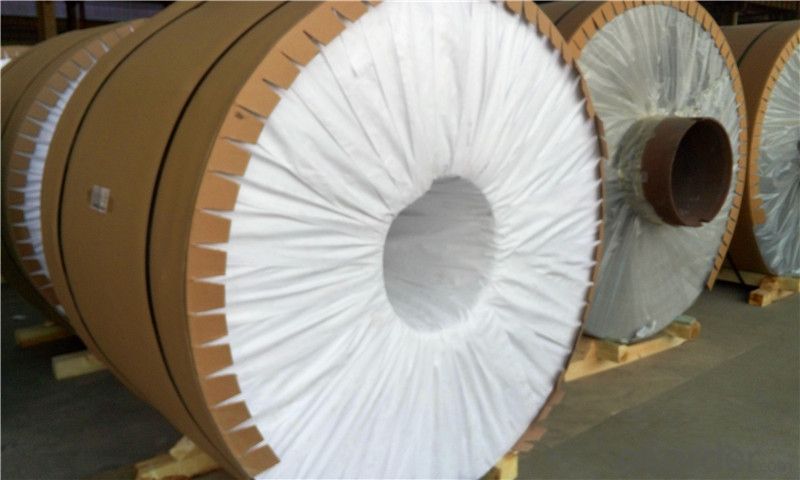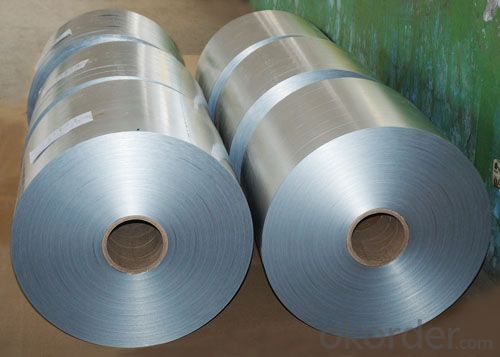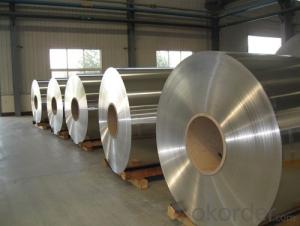3mm Thickness Pure 1050 1060 Aluminium Sheet Coil
- Loading Port:
- Shanghai
- Payment Terms:
- TT OR LC
- Min Order Qty:
- 5 m.t.
- Supply Capability:
- 6000 m.t./month
OKorder Service Pledge
OKorder Financial Service
You Might Also Like
Item specifice
3mm Thickness Pure 1050 1060 Aluminium Sheet Coil
Packaging & Delivery
Name | 3003 Aluminum Coil |
ALloy or Not | Yes |
Alloy | 1100H-18, 3003-H24,3003-H26,3005-H26,8011,3004,3105,5005,etc. |
Thickness | 0.1~1.5mm |
Width | <2000mm< span=""> |
MOQ | 1 MT |
Coating finish | Brushed, drawing, embossed, printing |
Color | As to code RAL |
Surface | Embossed,Mill Finish,Coated,Brushed |
Gloss | 10-90%(EN ISO-2813:1994) |
Total coating thick | PVDF27 ~35micron |
Polyester18~27micron(EN ISO-2360:1995) | |
Coating hardness | 2H |
Adhesion | 5B (EN ISO-2409:1994) |
Impact resistance | No cracking and peeling (A.S.T.M D2794-1993) |
Flexibility (T-bend) | 0T- 2T |
MEK resistance | 100 |
Certification | ISO9001:2000, CE, SGS |
Coil's standard diameter | 1100mm |
Inner Diameter | 405mm/505mm |
Coil's standard weight | 1MT - 2MT |
Product Specification | |
Grade | 1000 Series: 1050 1060 1100 3000 Series: 3003 3004 3105 5000 Series: 5052 5605,5083 6000 Series: 6061 6063 8000 Series: 8011 8021 8079 |
Thickness | 0.20-8.00mm |
Width | 2400mm max. |
Grade | 1000,3000,5000,6000,8000series |
Coil ID | 75mm, 150mm, 200mm, 300mm, 400mm, 508mm or negotiable |
Coil weight | 1000-5000kgs |
Coil OD | 1700mm max. |
Temper | O, H12, H14, H16, H111, H22 ,H24, H26, H28,T4, T6,etc. |
Chemical Composition | |||||||||
| Grade | Si | Fe | Cu | Mn | Mg | Cr | Ni | Zn | Al |
| 1050 | 0.25 | 0.4 | 0.05 | 0.05 | 0.05 | - | - | 0.05 | 99.5 |
| 1060 | 0.25 | 0.35 | 0.05 | 0.03 | 0.03 | - | - | 0.05 | 99.6 |
| 1070 | 0.2 | 0.25 | 0.04 | 0.03 | 0.03 | - | - | 0.04 | 99.7 |
| 1100 | Si+Fe:0.95 | 0.05-0.2 | 0.05 | - | - | 0.1 | - | 99 | |
| 1200 | Si+Fe:1.00 | 0.05 | 0.05 | - | - | 0.1 | 0.05 | 99 | |
| 1235 | Si+Fe:0.65 | 0.05 | 0.05 | 0.05 | - | 0.1 | 0.06 | 99.35 | |
| 3003 | 0.6 | 0.7 | 0.05-0.2 | 1.0-1.5 | - | - | - | 0.1 | remains |
| 3004 | 0.3 | 0.7 | 0.25 | 1.0-1.5 | 0.8-1.3 | - | - | 0.25 | remains |
| 3005 | 0.6 | 0.7 | 0.25 | 1.0-1.5 | 0.20-0.6 | 0.1 | - | 0.25 | remains |
| 3105 | 0.6 | 0.7 | 0.3 | 0.30-0.8 | 0.20-0.8 | 0.2 | - | 0.4 | remains |
| 3A21 | 0.6 | 0.7 | 0.2 | 1.0-1.6 | 0.05 | - | - | 0.1 | remains |
| 5005 | 0.3 | 0.7 | 0.2 | 0.2 | 0.50-1.1 | 0.1 | - | 0.25 | remains |
| 5052 | 0.25 | 0.4 | 0.1 | 0.1 | 2.2-2.8 | 0.15-0.35 | - | 0.1 | remains |
| 5083 | 0.4 | 0.4 | 0.1 | 0.40-1.0 | 4.0-4.9 | 0.05-0.25 | - | 0.25 | remains |
| 5154 | 0.25 | 0.4 | 0.1 | 0.1 | 3.1-3.9 | 0.15-0.35 | - | 0.2 | remains |
| 5182 | 0.2 | 0.35 | 0.15 | 0.20-0.50 | 4.0-5.0 | 0.1 | - | 0.25 | remains |
| 5251 | 0.4 | 0.5 | 0.15 | 0.1-0.5 | 1.7-2.4 | 0.15 | - | 0.15 | remains |
| 5754 | 0.4 | 0.4 | 0.1 | 0.5 | 2.6-3.6 | 0.3 | - | 0.2 | remains |
| 6061 | 0.40-0.8 | 0.7 | 0.15-0.40 | 0.15 | 0.8-1.2 | 0.04-0.35 | - | 0.25 | remains |
| 6063 | 0.20-0.6 | 0.35 | 0.1 | 0.1 | 0.45-0.9 | 0.1 | - | 0.1 | remains |
| 6082 | 0.7-1.3 | 0.5 | 0.1 | 0.40-1.0 | 0.6-1.2 | 0.25 | - | 0.2 | remains |
| 6A02 | 0.50-1.2 | 0.5 | 0.20-0.6 | Or Cr0.15-0.35 | 0.45-0.9 | - | - | 0.2 | remains |
| 8011 | 0.50-0.9 | 0.6-1.0 | 0.1 | 0.2 | 0.05 | 0.05 | - | 0.1 | remains |



- Q:How do aluminum coils contribute to noise reduction?
- There are multiple ways in which aluminum coils contribute to reducing noise. Firstly, aluminum, being a lightweight material, can effectively absorb and dampen sound waves. When utilized in coils, it aids in decreasing vibrations and minimizing the transmission of noise. Furthermore, aluminum possesses excellent thermal conductivity properties, which aid in dissipating heat and preventing temperature-related noises. This is particularly crucial in HVAC systems, where the noise generated by the equipment can be substantial. Moreover, aluminum coils can be designed with special features like grooves or fins that enhance their noise reduction capabilities. These features serve to increase the coil's surface area, facilitating better heat transfer and reducing noise levels. In general, aluminum coils offer an efficient and effective solution for noise reduction in a wide range of applications, making them a favored choice in industries where noise control is of utmost importance.
- Q:How do aluminum coils contribute to noise reduction in buildings?
- The unique properties and installation techniques of aluminum coils can contribute to noise reduction in buildings. To begin, aluminum's density and ability to absorb and dampen sound waves make it a highly efficient sound insulator. When used as coil insulation, aluminum effectively blocks and reduces airborne noise transmission, minimizing the impact of external sounds on the building's interior. In addition to aluminum's inherent sound insulation properties, the installation of aluminum coils in buildings can further enhance noise reduction. By strategically placing the coils in areas where noise transmission is likely to occur, such as HVAC systems and ductwork, potential gaps or openings that could allow sound to travel are eliminated when tightly sealed with aluminum coils. Furthermore, aluminum coils act as a barrier to vibration and resonance noises. They can be installed around mechanical equipment or structural elements prone to vibration, effectively dampening these vibrations and preventing them from propagating throughout the building. This is particularly important in reducing low-frequency noises, which are typically more difficult to control and can significantly impact the comfort and productivity of occupants. Moreover, aluminum coils offer durability and longevity, ensuring their effectiveness in noise reduction over a long period. They are resistant to corrosion, moisture, and other environmental factors, maintaining their sound-insulating properties and preventing sound leakage. In conclusion, by combining the sound insulation properties of aluminum with strategic installation techniques, such as sealing gaps and dampening vibrations, aluminum coils play a vital role in reducing noise transmission in buildings. Their ability to absorb, block, and dampen sound waves makes them an effective solution for creating quieter and more comfortable indoor environments.
- Q:Are there any limitations on the welding or soldering of aluminum coils?
- Yes, there are limitations on the welding or soldering of aluminum coils. Aluminum is a highly reactive metal with a low melting point, which makes it challenging to weld or solder compared to other metals. One limitation is the formation of oxide layers on the surface of aluminum, which inhibits the formation of strong bonds during welding or soldering. These oxide layers need to be removed before the process, typically by using chemical cleaning agents or mechanical methods, such as abrasive cleaning. Another limitation is the high thermal conductivity of aluminum, which causes rapid heat dissipation. This can make it difficult to achieve and maintain the required temperature for welding or soldering. Specialized equipment and techniques, such as using high-frequency welding or preheating the aluminum, may be necessary to overcome this limitation. Additionally, aluminum has a tendency to deform or warp easily when exposed to high temperatures. This can lead to distortion or changes in the shape of the coils during the welding or soldering process. Proper clamping or fixturing techniques are often required to minimize distortion and maintain the desired shape of the coils. Furthermore, the use of filler materials in welding or soldering aluminum coils can also be challenging. Aluminum has a relatively high thermal expansion coefficient, meaning it expands and contracts significantly with changes in temperature. This can result in cracks or weak joints if the filler material does not have a similar thermal expansion coefficient to aluminum. Specialized filler materials, such as aluminum-silicon alloys, are often used to address this limitation. Overall, while welding or soldering aluminum coils is possible, it requires specialized knowledge, techniques, and equipment to overcome the limitations associated with the material's reactivity, heat dissipation, deformation, and filler material selection.
- Q:Can aluminum coils be used in automotive body panels?
- Automotive body panels can indeed utilize aluminum coils. Being both lightweight and corrosion-resistant, aluminum proves to be a suitable material for automotive purposes. The employment of aluminum coils in body panels yields numerous benefits, such as enhanced fuel efficiency owing to the reduced vehicle weight, improved handling and maneuverability, and increased durability. Moreover, aluminum boasts high recyclability, rendering it an environmentally conscious alternative for automotive production. Numerous automakers have already begun integrating aluminum coils into their vehicles, and this trend is anticipated to persist as the industry aims for lighter and more environmentally sustainable automobiles.
- Q:Are aluminum coils resistant to UV radiation?
- Yes, aluminum coils are generally resistant to UV radiation. Aluminum is a highly durable and corrosion-resistant material, and it has natural properties that make it resistant to the damaging effects of UV radiation. Unlike certain other metals, aluminum does not oxidize or deteriorate when exposed to sunlight for extended periods of time. This makes it an ideal choice for applications where UV exposure is a concern, such as outdoor structures, solar panels, and automotive components. However, it is important to note that while aluminum is resistant to UV radiation, it can still be subject to other forms of degradation if not properly protected or maintained.
- Q:Who knows Xingtai aluminum shutter door how much is one square meter?
- East of the ox horn, that is, the South and the junction, then ask yourself, will not be a big difference
- Q:i know that your not suppose to use DC for aluminum only with AC but is it possible?
- be careful scrambling aluminum molecules...it gets brittle in a hurry...do it wrong and you're gonna mess up a lot of stuff.
- Q:What are the common transportation methods for aluminum coils?
- The common transportation methods for aluminum coils include trucking, rail, and shipping. Trucking is often used for short distances or when there is a need for prompt delivery. Aluminum coils are typically loaded onto flatbed trailers or specialized coil trailers equipped with cradles or coil racks to secure them in place during transit. This method offers flexibility and allows for easy access to various locations. Rail transportation is commonly used for long-distance shipments. Aluminum coils are loaded onto railcars, which are specifically designed to accommodate the weight and dimensions of the coils. Rail transportation is advantageous for its cost-effectiveness and ability to transport large quantities of coils in a single shipment. Shipping by sea is another common method for transporting aluminum coils, especially for international shipments. Coils are typically loaded onto cargo ships in specialized containers or directly onto the ship's deck. Shipping offers the advantage of carrying large volumes of coils over long distances, and it is often the preferred method for global distribution due to its efficiency and cost-effectiveness. Overall, the transportation methods for aluminum coils depend on factors such as distance, urgency, quantity, and destination. Companies must consider these factors to determine the most suitable transportation method for their specific needs.
- Q:Why is the aluminum roll upset?
- Mainly in the aluminum slitting process, for various reasons, does not meet the standards and specifications of products, can be used to roll the machine from the new trimming and slitting, winding up to meet customer needs of product specifications
- Q:Can aluminum coils be used in corrosive gas environments?
- Yes, aluminum coils can be used in corrosive gas environments. Aluminum is known for its excellent corrosion resistance, especially in atmospheric conditions. It forms a protective oxide layer on the surface that protects the metal from further corrosion. However, it is important to note that aluminum can be susceptible to certain corrosive gases, such as chloride and sulfur compounds. In such cases, additional protective measures, such as surface treatment or coating, may be necessary to ensure the longevity and performance of the aluminum coils in corrosive gas environments.
1. Manufacturer Overview |
|
|---|---|
| Location | |
| Year Established | |
| Annual Output Value | |
| Main Markets | |
| Company Certifications | |
2. Manufacturer Certificates |
|
|---|---|
| a) Certification Name | |
| Range | |
| Reference | |
| Validity Period | |
3. Manufacturer Capability |
|
|---|---|
| a)Trade Capacity | |
| Nearest Port | |
| Export Percentage | |
| No.of Employees in Trade Department | |
| Language Spoken: | |
| b)Factory Information | |
| Factory Size: | |
| No. of Production Lines | |
| Contract Manufacturing | |
| Product Price Range | |
Send your message to us
3mm Thickness Pure 1050 1060 Aluminium Sheet Coil
- Loading Port:
- Shanghai
- Payment Terms:
- TT OR LC
- Min Order Qty:
- 5 m.t.
- Supply Capability:
- 6000 m.t./month
OKorder Service Pledge
OKorder Financial Service
Similar products
New products
Hot products
Related keywords





























